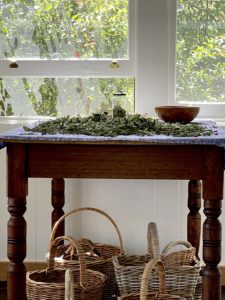
Stockpiling – the accumulation of groceries and house hold supplies – has become a dirty word since it is now associated with the pandemic and those crazy photos of adults behaving badly in the toilet paper aisle! Our grand parents and great grand parents and all the generations before them saw stockpiling or keeping a well stocked store cupboard or root cellar as a way of life, preserving the harvest and putting by when their finances allowed.
I grew up in a household where there was a large cupboard allocated for preserves, supermarket specials were often bought in bulk, there was a vegetable garden of some sort at different times, large amounts of locally grown fruit was purchased at the end of the growing season to be preserved and valued come the colder months. Dessert was often ice cream and preserved apricots, nectarines, or peaches, summer in a bowl.
I write more about this topic in my free ebook Preserve the Harvest. I’ll leave a link at the bottom of this post for you. There is also lots of great tips for preserving in small batches when you are time poor due to work commitments, have an injury or illness that prevents you doing big batches or are caring for young children and don’t have a large chunk of time to do something like preserving.
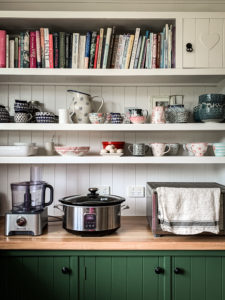
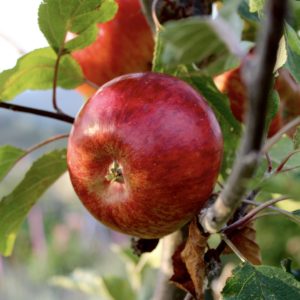
A couple of years ago (before the pandemic), I bought our years supply of blueberries from a local organic grower, we had shifted our blueberry bushes and I wasn’t relying on a big harvest. This is how I shop, buying in season and putting by. We all now know the benefits of this. Shopping local, supporting local growers, less food miles, fresh food, organic, picked in the morning, in the freezer by lunchtime. When I spoke to a friend and offered to collect some for her, she was perplexed, “Why would I want that many blueberries and outlay that much money instead of keeping my money in the bank?”. But here is the thing: I know we are going to eat that many blueberries this year, they have many health benefits and we love eating them, buying in bulk actually saved a lot of money instead of that money sitting in the bank.
And that is my segway to talking about having many different banks. Over the years, I have learnt the benefits of this and settled into feeling comfortable with it. We have a bricks and mortar traditional bank where we have our actual money, the store cupboard is our food bank, the garden an investment in growing and contributing to our different food banks, the freezers are another food bank and the herb cupboard where we keep dried herbs for teas and cooking is a form of food bank. If we only had our money in the bricks and mortar bank, we wouldn’t be making the best use of our money.
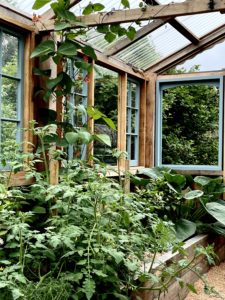
These different banks all need some general up keep. Just like the bank statements need checking, so do the contents in the freezer bank, the store cupboard bank and the herb cupboard bank to make sure nothing becomes past its use by date and wasted. The garden also needs tending to make sure our investments reach there full potential and can be harvested.
Each bank needs a general tidy up from time to time. Shelved wiped down, jars emptied, everything that needs using first put on its own shelf or at the front of the shelf. For example: at the moment I have chickpeas, red lentils and passata sauce that need using up, so I’ve grouped them all together.
I can honestly say hand on heart that over the years there hasn’t been that much food waste, and if there was any it went to the hens or compost. For arguments sake, lets say 10kg of food in total was wasted due to freezer burn, going soft in the store cupboard and include the batch of pickles that went mouldy because I didn’t sterilise the jars as well as I usually do. Let’s put a price on the food and round it up to $10 per kilo, that is a total of $100 in food waste (can we really call it food waste if it is returned to the earth via nourishing compost or fed to hens who turn it into eggs or fertiliser for the garden?). So, I lost approximately $100 in food and saved thousands thanks to my store cupboard bank, freezer bank and herb cupboard bank.
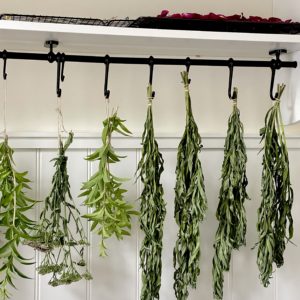
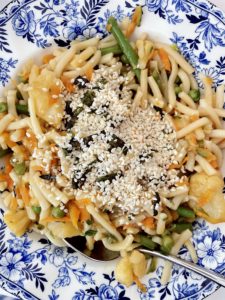
Lunch today made by Lil using some left over noodles from last night’s dinner.
Some things I am surprised about:
I honestly thought I would stockpile junk food treats and I haven’t. Probably because I know we would just eat them first!
I’m surprised that stockpiling or keeping a well stocked store cupboard has become some new thing, like mashed avocado and kale were. It just makes common sense to me. We live in the countryside, the only take away we eat is a pie every now and again from the sourdough bakery and every other meal we make from scratch.
I got asked if I was a “prepper” – I had to go and look the word up. Well, that is a whole other world isn’t it. No, I am not a prepper.
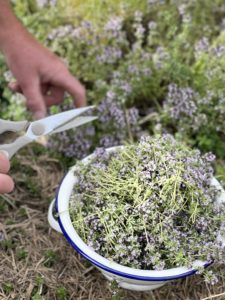
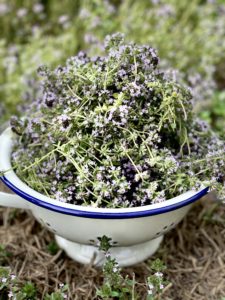
Apart from saving money, having all our “banks” feels very freeing. We aren’t reliant on supermarket shelves being full, there are lots of choices with what’s to eat and the excess eggs, fruit and vegetables we grow are shared with a friend who no longer keeps hens or grows food .
I appreciate that this is a privileged position to be in at the moment and at the same time it is something that we have worked hard on to make happen and have made sacrifices to do it. There have been very deliberate choices made to get here; instead of installing a second bathroom in our cottage we forgo it and made the space into a store cupboard. We have invested in a store cupboard instead of nights out, going to restaurants, holidays or expensive designer clothes. On days off, public holidays and after paid work we tend the garden. We plan and create new routines to fit in preserving. It’s a choice, and I am grateful that we can even have that choice. Michael and I have created a cosy home based on what feels right for us. It feels very safe.
I’ll be back tomorrow with some tips to help get you started on your own store cupboard.
Until then, much love, Jude x
Preserve the Harvest Free Ebook
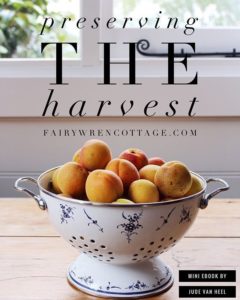
The Store Cupboard #1
January 11, 2022
comments
share